The year was 1847, and the United States had intervened in Mexico. American troops were dispatched to San José del Cabo as part of this intervention. On their arrival, they anchored their navy ship, the “Portsmouth”, which was under the command of Captain John M. Montgomery. The ship’s crew consisted of 14 men who quickly took possession of the town and made their base in the Casa Cural. This building is currently called Casa de la Cultura “Prof. Alfredo Green González”. As part of their mission, the American troops issued a demand to the local authorities, insisting that they surrender all public property to the United States.
Local community leaders armed themselves to resist the invasion and combat nonconformity. In October, a protest was orchestrated in San José del Cabo, during which protesters brought down the American flag and expelled American civilians. The locals, commonly referred to as “the Josefinos,” were ecstatic following their triumph over the same opponents in Mulegé.
Historical records recount the fascinating tale of Lieutenant Charles Heywood and his troupe of 24 soldiers left by Commander Shubrick, chief of the U.S. naval forces in the Pacific. With a month’s supply of provisions. Instead of marching ahead, they found refuge in Casa Cural, a fortified structure. Heywood fortified the structure by walling up the doors and windows, leaving only narrow arrow slits (wall or rampart from which firearms can be fired with protection. He also raised a railing on the roofs and built a tunnel,which allowed him to communicate with nearby buildings like the Moüet family house and the parish of San José del Cabo Añuití. It’s worth noting that Heywood remained curiously committed to maintaining religious connections despite the church’s closure due to the ongoing war.
Today, a local legend in San Jose del Cabo claims some of Josefino’s most prominent properties are connected by mysterious subway conduits (underground tunnels). Lieutenant Jose Antonio Mijares is believed to be the source of this tale, but there is no concrete evidence to support it. José Antonio Mijares (1819–1847) was a Mexican Army Lieutenant who led the Mexican resistance against the Americans in the Battle of San Jose Del Cabo, where he was killed leading the assault. Today, Lieutenant José Antonio Mijares’ monument stands proudly in San José del Cabo. However, there is no official record of the tunnels’ existence, and it remains unclear whether they were ever constructed. Despite the lack of evidence, locals and tourists alike are fascinated by the idea of these mysterious underground tunnels. Some even claim to have seen entrances to the tunnels while exploring the town. Whether the tunnels remain or not, the legend lives on and continues to intrigue visitors to this day. Do you think these tunnels remain?















 Bajo estrella
Bajo estrella
